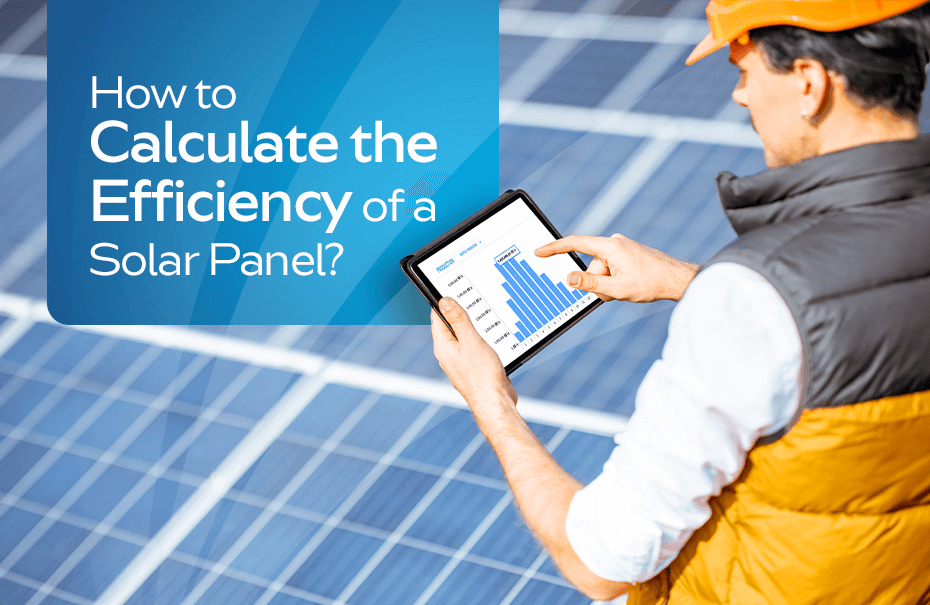How to Calculate the Efficiency of a Solar Panel?

Solar panel efficiency refers to the solar panel’s ability to convert sunlight into usable electricity. Expressed as a percentage, this efficiency determines how much power a solar panel can produce from sunlight. The higher the coefficient of efficiency, the more electricity output a panel can deliver.
The efficiency of solar panels in converting solar energy into electricity is affected by various factors.
Study says that only some of the sunlight that reaches the solar panel can be converted into electricity. Around 33% of total sunlight is converted into electricity as some of the sunlight is reflected, some is absorbed as heat, and some is not of the right wavelength that can be utilized to convert into electricity.
Also solar materials have inherent limitations however, current research and some technological developments in current time aim to improve the efficiency of solar panels, to increase the % of solar energy that can be converted to generate electricity.
Let us understand how solar panel efficiency is calculated and some factors that affect its efficiency.
How to Calculate Solar Panel Efficiency?
Before moving forward we need to understand that the efficiency of solar panels is not the power but it is concerned with the matter of area. Here’s how to calculate it, along with a simple example:

Where:
- Power output is the electrical power produced by the solar panel (in watts).
- Sunlight irradiance is the intensity of sunlight falling on the panel (in watts per square meter).
- Panel area is the surface area of the solar panel (in square meters).
Here is a simple example to get more conceptual clarity:
Let’s say we have a solar panel with the following specifications:
- Power output: 500 watts*
- Sunlight irradiance: 1500 watts per square meter*
- Panel area: 1.5 square meters*
Using the formula:

So, the efficiency of the solar panel in this example is approximately 22.22%.*
As discussed above, the maximum solar conversion efficiency is around 33.7%, according to Shockley Queisser Limit Research. If the solar cells are multi-layered then the single cell when multiplied can produce more energy however, this can make the manufacturing process of solar panels more complex and even much more expensive.
What are the Factors That Determine Solar Panel Efficiency?
The solar panel efficiency is not only affected by the sunlight absorption capacity, some factors contribute to determining the panel efficiency like:
The type of solar materials quality that are used in making solar cells.
Solar panels perform inversely at higher temperatures. Increased temperature can lead to higher resistance in the solar cell and reduce the overall efficiency of solar panels by just heating the panel.
The intensity of the sun also impacts the solar panel efficiency. High-level sun irradiance can lead to more energy production and vice-versa.
The amount of dust or shading can also affect the panel’s efficiency as it creates a layer of dust that blocks sunlight absorption.
The materials used in raw materials and the manufacturing process used in producing the panel can even influence not only the efficiency but also the longevity of the panel. High-quality components for solar panels lead to good power generation. Being part of the solar industry for years, we suggest that better input can give better output, hence the solar materials produced at our plant are not only qualitative but also facilitate the panel’s longevity.
Tips for Improving Solar Panel Efficiency
Time-to-time Maintenance
Solar panels are to be installed outside weather, hence it is very obvious that the dust and debris can create a blockage layer that makes the sunlight absorption difficult. Hence, keeping solar panels clean and free from dust is necessary to maximize the efficiency and lifespan of the panel.
Position of Solar Panel
The position of your solar panel can play a big role in the absorption of sunlight. If the panel is reversely positioned or positioned in the opposite direction of the sun then the sunlight is not captured by the solar cells. Hence, the position of the panel should face the sun directly and you can even adjust the tilt angle for maximum exposure throughout the day.
For maximum output and performance of the solar system, the efficiency and the factors we discussed are very critical. One needs to understand the factors that can influence the ultimate output. The full potential for the panel not only depends on the panel or sun but also on the materials used in production, the position maintenance, etc.
As an owner, it becomes your responsibility to provide quality panels as for the installers, they are an investment for 2 to 3 decades.
Hence, dig out the best solar material manufacturer, and get proper knowledge about the industry and the math involved in the calculation of efficiency.
